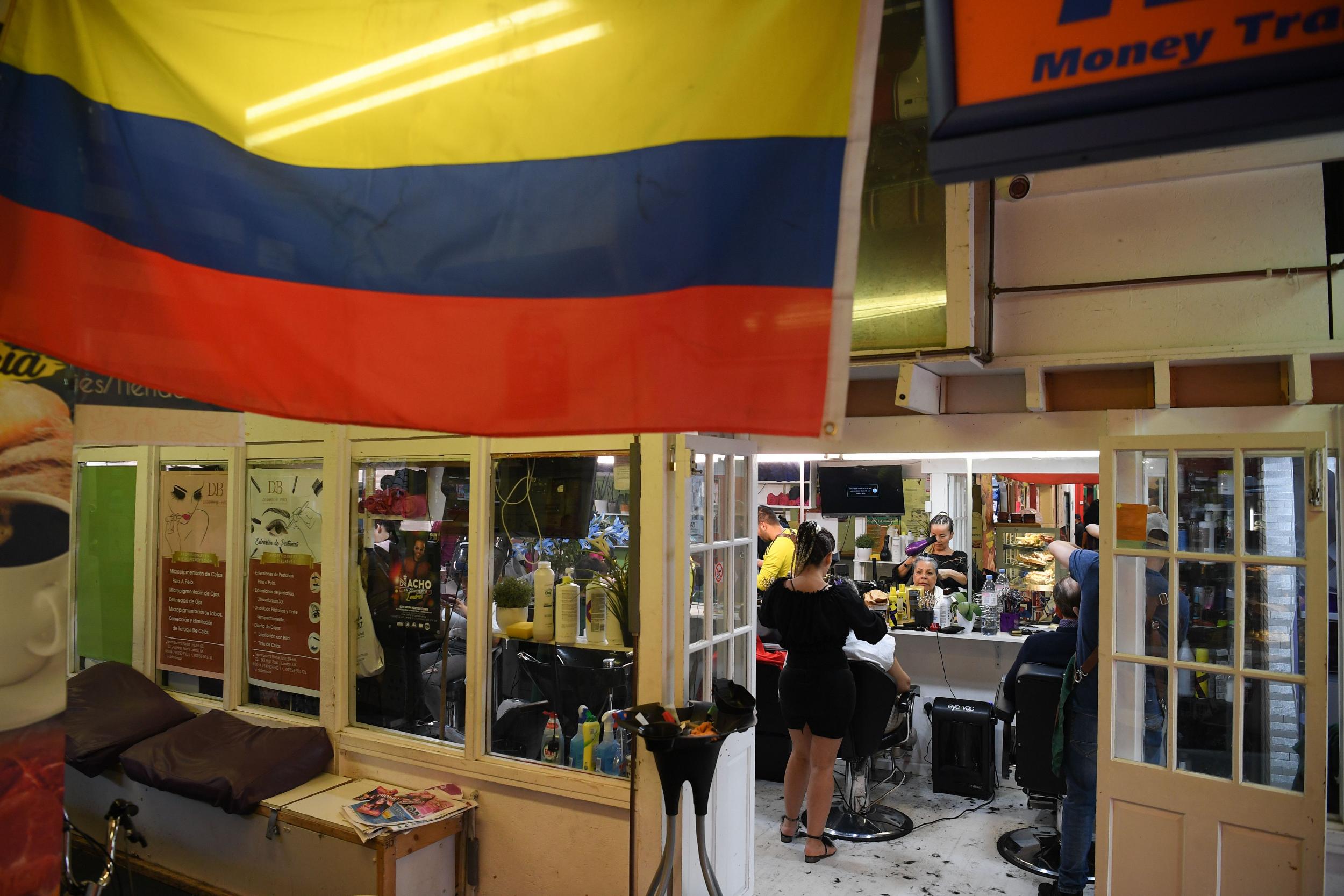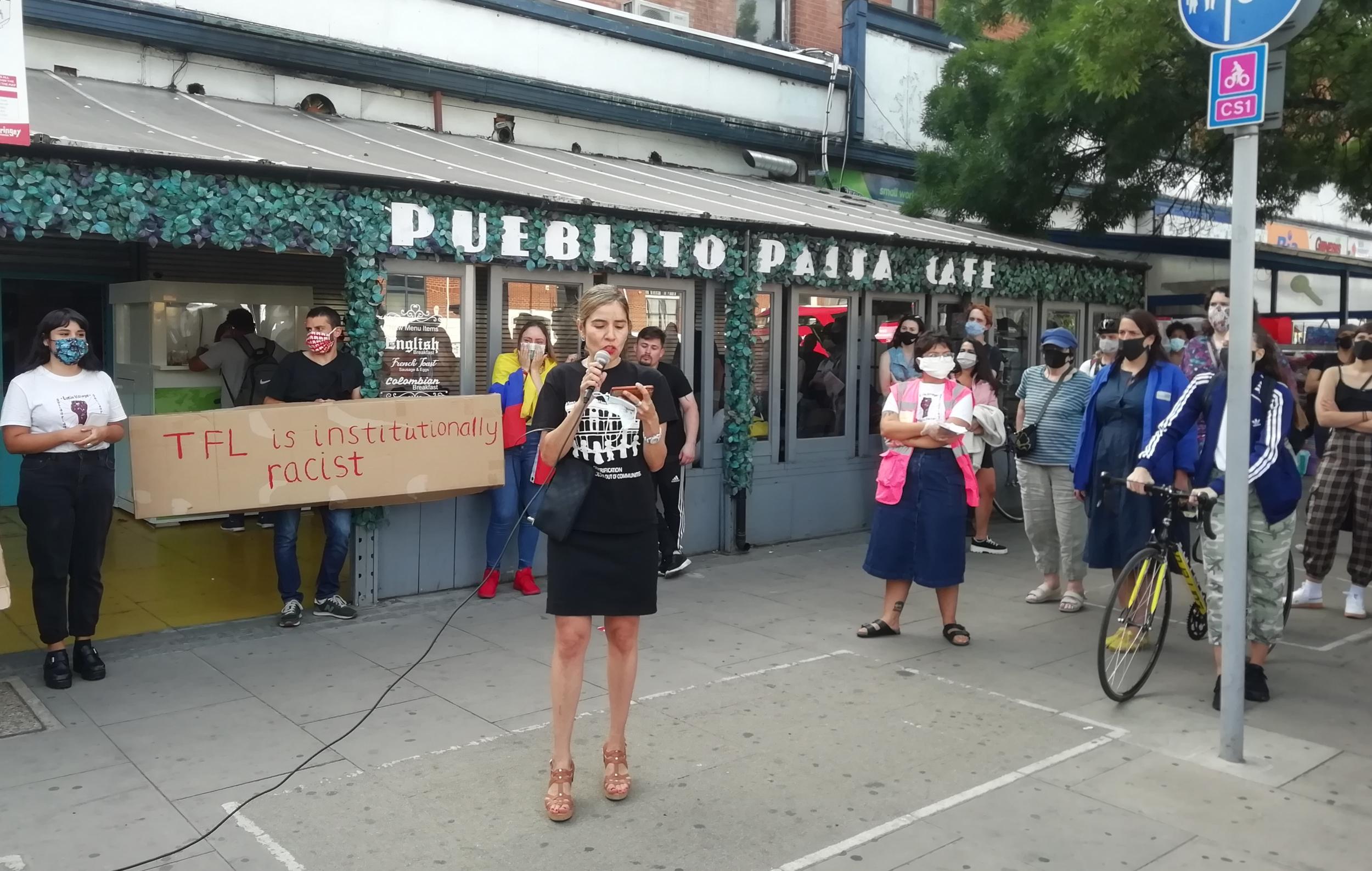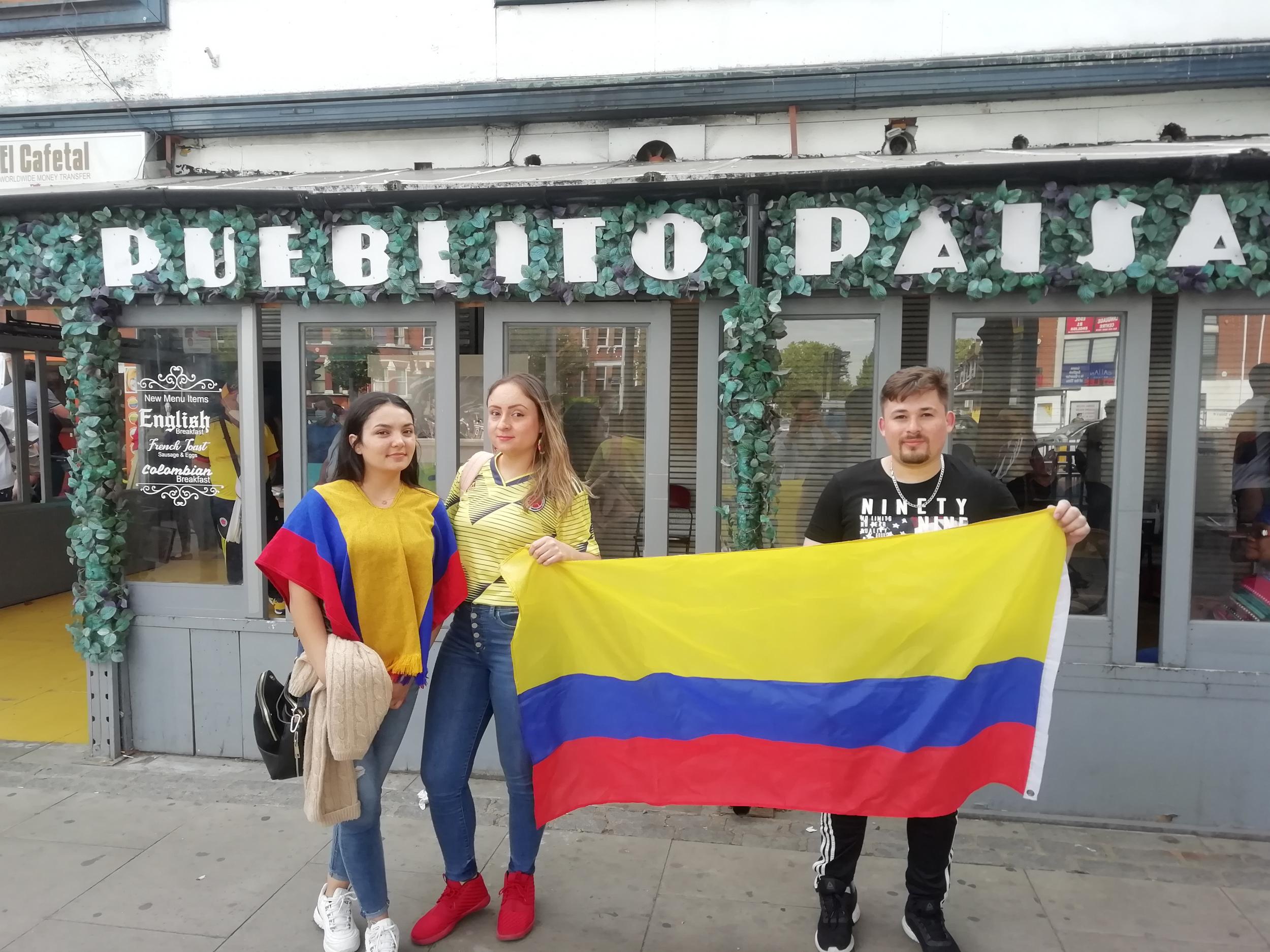‘We’re far from home, but here we have a little corner to ourselves’: Latin Village protesters call for market to be reopened
Ian Johnston speaks to Latin Americans living in north London who fear the market, which hosts the second-largest Latino community in the UK, could soon be forced to close its doors for good

Seven Sisters Indoor Market typically throngs with Colombian restaurants, shops and beauty salons, narrated by shouts of Spanish and salsa beats. But after other indoor markets reopened on 15 June, Tottenham’s “Latin Village” remains under lockdown.
On Thursday night, dozens of people gathered outside the north London market to protest its continued closure and long-term proposals to replace it with a modern retail centre.
Clad in masks, gloves and Colombian football shirts, protesters sang the Colombian national anthem, chanted “Save Latin Village” and listened to speeches calling for an end to “gentrification” and “social cleansing”.
The indoor market is home to 60 small businesses and employs over 100 locals, mostly of Latin American descent. The site fell into disrepair under previous manager Market Asset Management (MAM), which declared insolvency in June. Transport for London, the site’s landlord, took over the lease on 7 July and announced health and safety repairs to gas and electricity systems, telling traders the market will not reopen before October.
The closure is the latest in a long-running dispute over the site. In 2004, Haringey Council agreed plans with property developer Grainger to redevelop the site into a modern retail centre. But, through over a decade of campaigning and legal battles, including a human rights case at the United Nations, market traders won several protections.

All current traders will relocate to a temporary site opposite the current market when construction begins, and move back to the site once it finishes. Traders will have a three-month rent-free period in the temporary market and licence fee protections at the new site.
But campaigners say the Latin Village’s unique character will be lost. They also say the “managed decline” of the site by MAM amounted to “racial discrimination”, and that TfL could have stepped in earlier.
Mirca Morera, who founded the Save Latin Village campaign, told the crowd: “TfL have known about the problems here for years. Like Grenfell, a Bame community complained for years and years and it falls on deaf ears. Why? Because we’re considered less important.”
Victoria Alvarez, the chair of the Seven Sisters market tenant association, told The Independent: “We have been displaced many times because the majority of the traders are refugees. And you feel like you’re going to be displaced again.”
The campaigners have developed an alternative community plan, through which traders would remain on-site during building works and rent prices would not go up. But protesters have tried and failed to challenge the contract to sell the market building from TfL to Grainger.
At the protest, Santiago Peluffo, a campaigner who sought to protect the former Elephant & Castle shopping centre, compared the plans to the fate of other minority ethnic hubs in London. He said: “The story behind both is the same: so-called ‘gentrification’ is happening to a community that established itself 20 to 25 years ago.”
Criticising Haringey council and Sadiq Khan, he added: “We need to keep campaigning because no one is going to do it for us.”
Protesters told The Independent about the emotional connection they feel to a place they call the “Pueblito Paisa”. Jose Andres, whose wife is a hairdresser in the market, said: “We’re far from home, but here we have a little corner to ourselves.” Dressed in a Colombian football shirt and a traditional sombrero, he said: “This place stops us losing that Latin warmth, that sense of family and our customs.”
Carlos Burgos, an elderly Salvadorian who arrived in 1976 and spends most of his time at the market, said through his protective mask: “It’s a symbol to tell our children and grandchildren about our culture. We don’t need this. We’ve been saying so for 13 years.”
Alvarez has been a market trader for 18 years and runs a beauty salon and money transfer business. She said the pandemic and the uncertainty over the site’s future have left some traders suffering from mental health difficulties. Javie Huxley, a trustee of the Save Latin Village campaign and protest organiser, told the crowd: “Knowing that my community hub is going to be closed has been a really heartbreaking thing to come to terms with over this time.”

However, not all of the traders agreed with the protest. Marta Hinestroza, the director of the Pueblito Paisa Community Centre, worked on early campaigns but she did not attend last night.
Hinestroza, a former human rights lawyer in Colombia, said: “We had a really tough battle and, though we didn’t win, we managed to make them change the terms of the agreement. This was a great achievement because we came from nothing.”
It’s a symbol to tell our children and grandchildren about our culture. We don’t need this. We’ve been saying so for 13 years
While the Seven Sisters Market Tenant Association says 60 per cent of traders back the campaign, Hinestroza claims the figure is less than half and is optimistic that the market will survive under the plans: “It’s a challenge but the conditions are there for us to come out on top and be stronger.”
Her desire to pay the campaigners’ barristers and lawyers led to disagreements with other campaigners. She was “excluded” from Whatsapp groups and felt “isolated” from others, she said.
In appointments to the tenants’ association this week, supporters and opponents of the redevelopment will have equal representation. Chan Seenandan, a Guyanese woman, has been working in the market since 1991. She said: “I don’t mind going over to the other side. We’re getting something better to trade in: better heating, better air conditioning and better toilets. Everything should be a little better and safer.”

Asked about the disagreements, Alvarez said: “Everyone is united in the struggle. We’re all losing out, regardless of which side you are on.”
Hinestroza has also lobbied TfL this week to address the “abandonment” the site was left in. In a letter seen by The Independent, she and other traders asked TfL for appropriate compensation for the four months of lost income that the closure will entail and a timetable for the repairs, calling the amount of time for repairs “excessive”.
A spokesperson for TfL said the traders will receive the same support as small business tenants across London.
In a statement, Graeme Craig, director of commercial development at TfL, said: “Since 7 July, we have been working to address the outstanding health and safety issues to enable the market to reopen at the earliest opportunity. The market is an important local asset and we are keen to see it reopen and thriving when it is safe for customers and traders to do so. We are in regular communication with the traders to offer information and support.”
Join our commenting forum
Join thought-provoking conversations, follow other Independent readers and see their replies
Comments
Bookmark popover
Removed from bookmarks